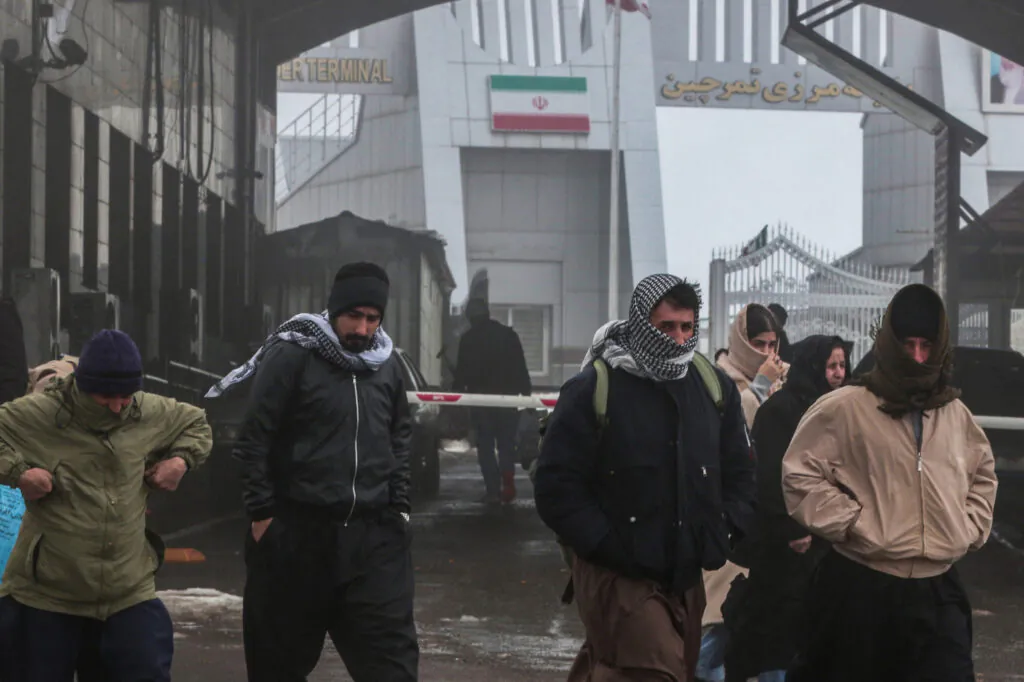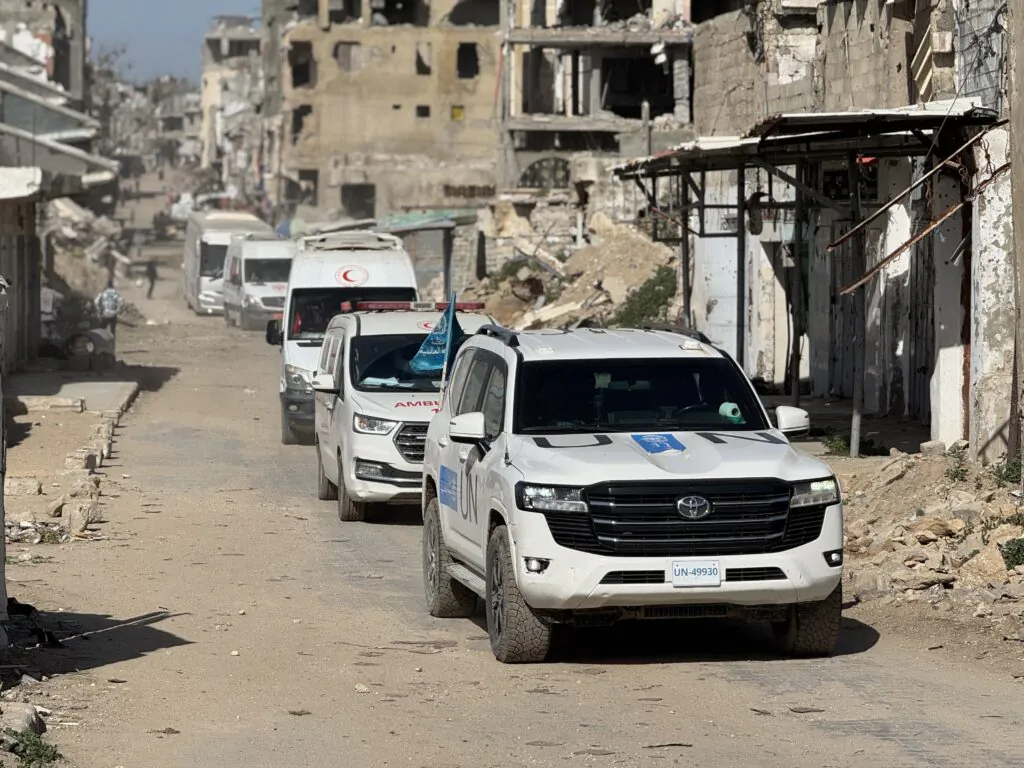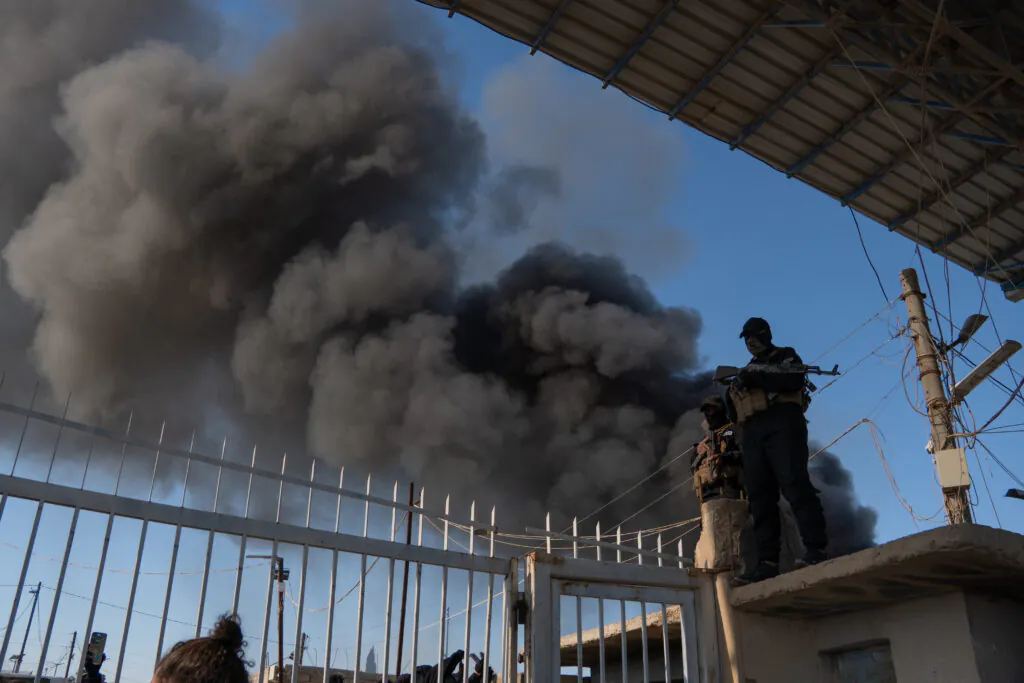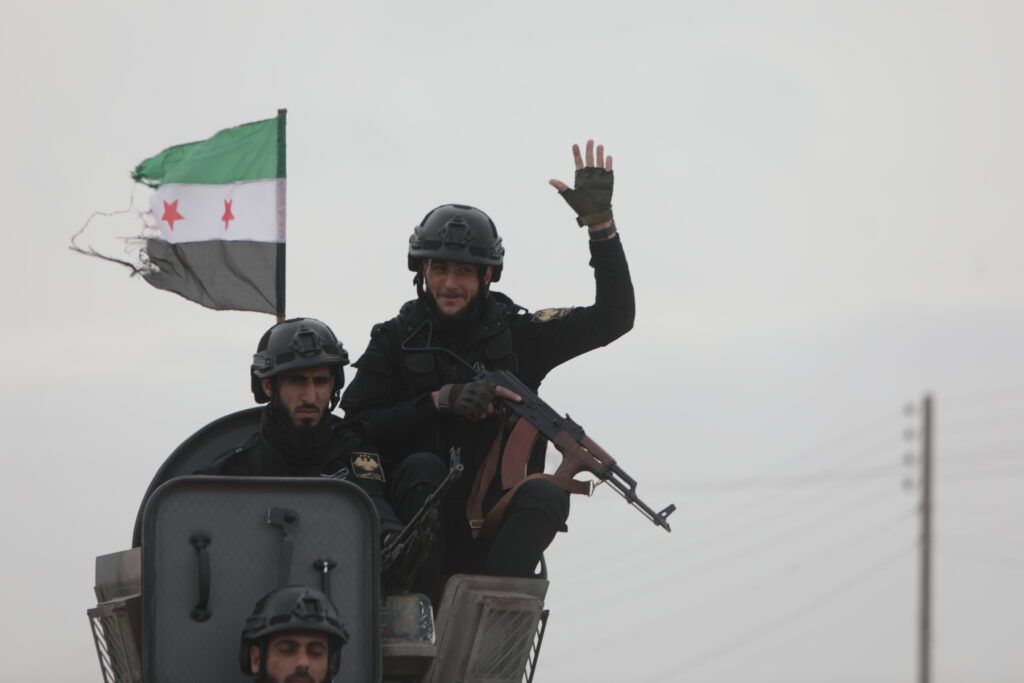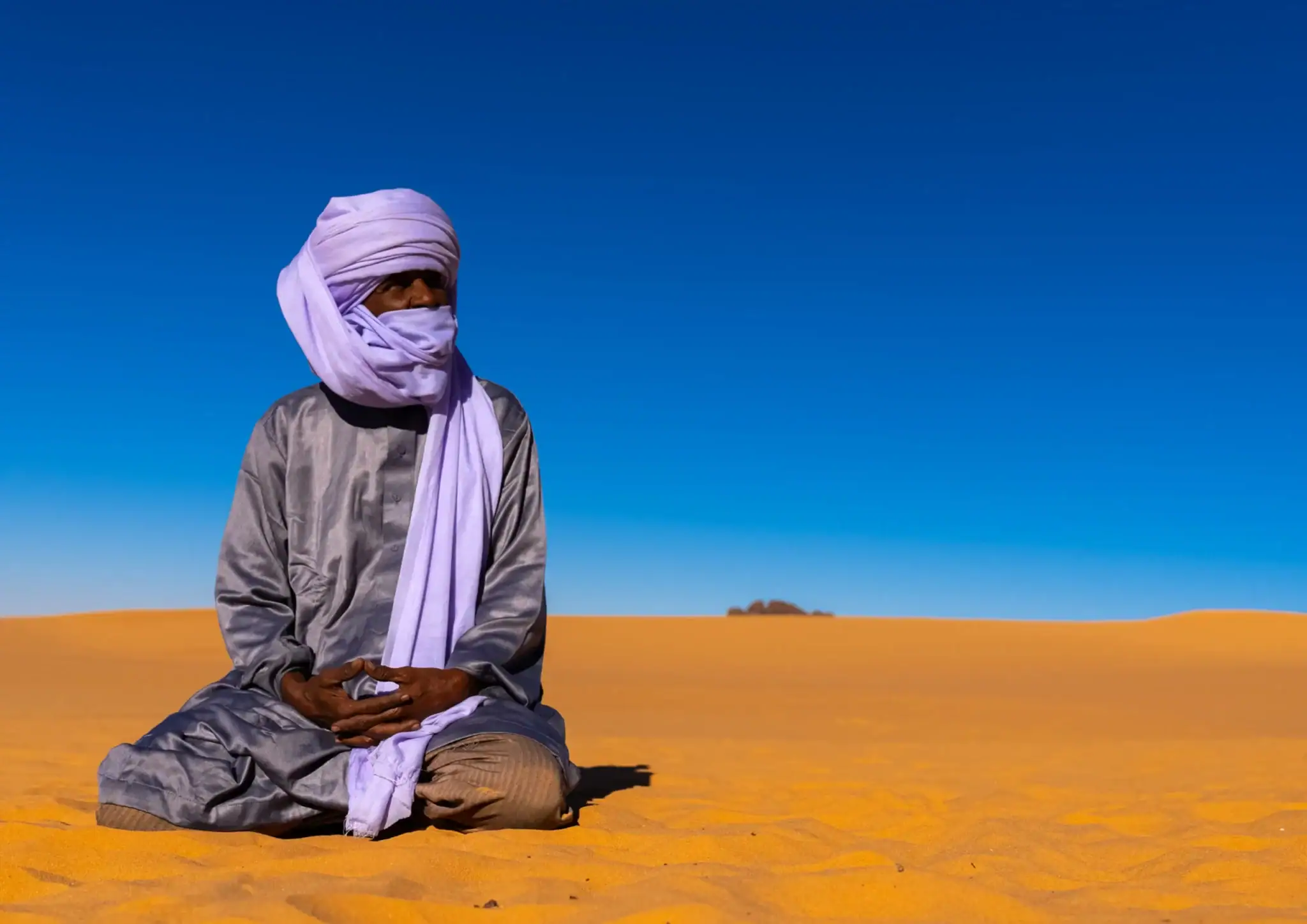
U.S. Engagement With Algeria’s Tuareg Is a Strategic Imperative
In early April, Algeria shot down a Malian autonomous military aircraft near Tin Zaouatine, adjacent to their shared border. This military-first approach epitomizes a troubling trend that has deepened rather than resolved the marginalization of Tuareg communities across Algeria’s southern provinces, creating vulnerabilities that extend far beyond national borders.
Youth unemployment exceeds 30 percent in those resource-rich yet politically neglected southern regions, including Tuareg areas, while state investment remains concentrated in northern urban centers. Poverty statistics reveal the disparity: Young people in rural regions are 3.64 times more likely to live in poverty than their urban counterparts. In eastern Algeria, 31% of rural residents face multidimensional poverty compared with 8% in urban areas. This inequitable wealth distribution, combined with the systematic neglect of peripheral communities, threatens to widen existing gaps and undermines the country’s long-term economic development potential.
The persistence of these grievances, combined with the proliferation of armed groups across the broader Sahel, presents both immediate risks and strategic opportunities for U.S. engagement. From a security perspective, if the U.S. does not successfully intervene through a regional military strategy, actors like Russia or China could establish authoritative influence and become key players in the space. In the military sphere, Russia has become a dominant force. The Kremlin recently appointed Gen. Sergey Surovikin to oversee Russian advisory forces in Algeria, a move that goes far beyond the countries’ deep historical ties.
As the United States pulls back from North African diplomacy, it has limited involvement, if any, in Algeria, creating a golden opportunity for competitors such as Russia to establish regional influence though militarization. If U.S. policy remains stagnant, this militarization could affect international diplomacy.
To mitigate that risk, the United States should pursue three complementary strategies: support participatory field research through Algerian institutions, prioritize localized aid delivery mechanisms, and formally engage Tuareg diaspora organizations as civic intermediaries, into a capable, diplomatically balanced region that focuses on equity between all of their citizens and a strong growing economy. These approaches offer cost-effective alternatives to reactive military interventions while advancing core U.S. interests in regional stability and democratic governance.
Tuareg Exceptionalism
The amenokal system, which Algeria formally abolished in 1977, was led by a traditional supreme chief of a Tuareg confederation, governing through consensus-based councils and representing the highest political authority in traditional Tuareg society. Its abolishment marked the end of centuries-old governance structures, yet the underlying social disruptions had begun years earlier. A severe drought in the 1970s fundamentally transformed Tuareg society. It left thousands of Tuareg dead and destroyed their remaining herds, ending centuries of nomadic pastoralism in a single devastating blow. Since their entire economic system relied on individual labor for pastoral work and cattle herding as their primary source of wealth, these deaths triggered economic collapse.
Before that drought, Tuareg nobility controlled trade routes and pastoral resources in a sophisticated nomadic economy. The drought forced mass migration into Tahaggart-chumara, an impoverished settlement on Tamanrasset’s provincial outskirts, creating a profound cultural and economic crisis. Tuareg communities lost their traditional livelihoods of pastoralism, desert navigation, and trans-Saharan commerce, and became dependent on day labor and cross-border smuggling. This transition reveals Algeria’s distinctive approach to traditional authority. Rather than violently suppressing the amenokal system, Algeria co-opted it. El Hadj Mussa, from the traditional Kel Ghela ruling tribe, became a parliamentary deputy in 1976, thus maintaining tribal legitimacy within democratic structures. This controlled integration demonstrates that the United States can work within existing governance systems rather than circumventing them. This dual pattern of elite integration and grassroots displacement distinguishes Algeria from other Sahel cases, offering the United States both established institutional partnerships and clear developmental challenges that targeted engagement could address.
The Strategic Challenge
Economic Marginalization Amid Resource Abundance
According to the International Crisis Group, Algeria’s southern provinces represent “politically marginal but economically crucial oil-producing areas” that have experienced “successive waves of unrest” driven by “resentment growing against central authorities.” Despite significant hydrocarbon reserves, these regions receive minimal state investment compared with northern Algeria, creating a paradox of poverty amid abundance that fuels political grievances.
The Algerian Tuareg are marginalized for multiple reasons, and understanding their present situation requires looking at historical and structural factors. Location is key. The Tuareg traditionally live in remote areas with minimal infrastructure. As a result, the Algerian government often overlooks their needs, making access to public services like education difficult due to the lack of roads and other essential infrastructure where those Tuareg live. As a visible minority without strong representation in leadership, the Tuareg must strategically navigate communal issues with the government. Their approach ranges from peaceful advocacy to more forceful protests, depending on the issue.
Climate and geography also play a role in their marginalization. The Tuareg historically relied on Trans-Saharan trade routes for resources such as gold, salt, and ivory. The establishment of modern, regulated national borders disrupted these traditional trade networks, undermining their economic foundation.
The contrast between northern and southern Algeria further reinforces marginalization. The north, with its coastal geography and fertile soil, is considered more habitable and receives more government attention and investment. In contrast, traditionally nomadic inhabitants of the south, a region characterized by desert terrain and frequent border conflicts, experience greater neglect, leaving the Tuareg communities to contend with persistent social and economic disparities. U.S. engagement with Algerian Tuareg represents the completion of a transnational network that already includes diplomatic relationships through the Mali peace process, development partnerships in Niger, and established diaspora communities in France and the United States. Algeria represents the final geographic piece needed for comprehensive Sahel engagement through this cross-border community. The Algerian government’s security-focused response has proven counterproductive to help groups that are marginalized in the Tuareg regions . Following Al-Qaeda in the Islamic Maghreb’s (AQIM’s) March 2016 attack on the Krechba gas facility near In Amenas, Algerian military spending increased substantially while social investment stagnated. This approach has escalated rather than resolved regional tensions, as evidenced by the recent Mali-Algeria crisis that resulted in closed airspace and severed diplomatic relations between the two countries.
Regional Spillover Dynamics
Southern Algeria shares structural vulnerabilities with Sahel regions where governance failures have enabled extremist expansion. AQIM’s gas facility attack was accompanied by explicit statements about environmental protection and opposition to shale gas exploration, demonstrating how terrorist organizations exploit local grievances endured by local Tuareg to legitimize their presence. The facility, about 750 miles south of Algiers, sits in a sparsely monitored central Saharan region where extremist groups exploit weak state presence to expand their influence across the Sahel.
Tuareg communities face vulnerability to these security threats due to their geographic location in remote border regions where state presence is weak and economic opportunities are scarce. The combination of youth unemployment and proximity to trafficking routes creates conditions that criminal and extremist networks exploit for recruitment and logistics.
The proliferation of weapons has accelerated dramatically. Algerian security forces seized more large-caliber weapons for the past several years since the 1990s Algerian Civil War, reflecting increased arms smuggling from Libya and Mali.
Strategic Rationale and Implications
China’s Belt and Road Initiative investments and Russia’s expanding security partnerships across North Africa demonstrate how authoritarian actors exploit governance gaps to advance geopolitical influence. American re-engagement in southern Algeria could showcase democratic development alternatives while advancing core U.S. strategic interests in regional stability and great power competition.
Russian mercenary groups have expanded operations across the Sahel, often displacing Western partners and undermining democratic institutions. Chinese infrastructure investments, while addressing immediate needs, frequently lack transparency and community consultation mechanisms. American engagement offers superior governance models that strengthen rather than undermine local institutions. The former U.S. diplomatic partnership with Algeria’s University Linkage Program, for example, advanced industry programs in English as a foreign language and business, increasing Algeria’s educational capabilities. That four-year program ended in 2014.
Such development assistance requires substantially lower financial investment than military interventions while delivering superior long-term results. The total cost of AFRICOM operations across the Sahel exceeds $1 billion annually yet has failed to prevent the regional instability that displaced millions and enabled extremist expansion.
While Algeria has not experienced a similar institutional collapse as have other Sahel areas, early intervention in its southern regions could prevent the displacement crises and humanitarian catastrophes that would accompany one. There are, therefore, opportunities for preventive engagement that are far less costly than reactive crisis management.
Because Algeria is Africa’s largest country and a crucial European energy supplier, its internal stability is essential for broader regional security. Supporting inclusive governance in marginalized provinces thus serves both U.S. strategic interests and humanitarian objectives while strengthening partnerships with European allies dependent on Algerian energy exports.
Success in southern Algeria through grassroots implementation, partnership agreement, and gained alliance would demonstrate American capability for effective engagement in challenging environments, potentially encouraging similar approaches in other marginalized regions across North Africa and the Sahel.
Conclusion
Southern Algeria represents both strategic opportunity and moral imperative for renewed American engagement. The Sahel region’s continued marginalization creates risks extending far beyond Algeria’s borders, while its potential for positive transformation remains largely untapped.
Research partnerships, localized aid delivery, and diaspora engagement offer complementary approaches for rebuilding U.S. influence in Algeria while serving legitimate community interests. These initiatives would require substantially lower financial investments than military alternatives while providing superior long-term stability outcomes.
American policymakers must choose between proactive engagement and reactive crisis management. Recent history across the Sahel demonstrates the escalating costs of neglecting marginalized regions until instability becomes unavoidable. Southern Algeria offers an opportunity to reverse this pattern through strategic, community-driven development partnerships that advance both American interests and local aspirations for inclusive governance.
Policy Recommendations
1. Establish Participatory Research Partnerships
The U.S. Department of State should collaborate with Algerian universities and civil society organizations to conduct comprehensive needs assessments in southern provinces. Such partnerships would build trust with marginalized communities and generate credible, policy-relevant data for Algerian decision-makers.
The U.S. International Development Finance Corporation (DFC) should prioritize funding collaborative research initiatives with institutions such as the University of Tamanrasset. While direct U.S. development assistance in Algeria has ended, the previous benchmark of directing 25 percent of funding to local partners remains relevant for structuring renewed engagement.
These types of research partnerships would demonstrate American commitment to evidence-based policymaking while providing Algerian authorities with independent analysis of the southern provinces’ development needs. The approach builds legitimacy through transparency and local ownership rather than external imposition.
2. Implement Localized Aid Delivery Mechanisms
Future American initiatives must prioritize local ownership and decision-making authority. The DFC should establish grant mechanisms specifically for Algerian civil society organizations operating in southern provinces, emphasizing groups with demonstrated community connections and transparent governance structures.
Localization offers practical advantages beyond political legitimacy. Local organizations understand cultural dynamics, possess established community trust, and can navigate Algeria’s restrictive political environment more effectively than external actors. This approach reduces bureaucratic friction while building sustainable institutional capacity for long-term development.
The strategy aligns with broader localization goals of the now-defunct U.S. Agency for International Development (USAID), which allocated 11.2 percent of eligible funding to local partners in fiscal year 2024, representing steady progress toward community-driven aid delivery. Adapting this model for use in Algeria would advance both development effectiveness and strategic objectives.
3. Formalize Diaspora Engagement Mechanisms
Tuareg diaspora communities across France, the United States, and North Africa possess unique strategic assets: cultural fluency with local communities and international donors, established trust networks, and independent financial resources for development initiatives.
In 2023, diaspora groups publicly condemned the Nigerien junta for excluding Tuareg representatives from key agreements, reaffirming their commitment to the 2015 Algiers Peace Accord principles of decentralization, regional autonomy, and inclusive governance. This engagement demonstrates both political sophistication and sustained commitment to democratic processes.
Partnerships should leverage diaspora knowledge of Libya labor migration circuits and traditional salt/date trade routes to design economic programs that work with rather than against established cross-border networks. The U.S. State Department should establish formal consultation mechanisms with major Tuareg diaspora organizations to inform policy development while providing alternative channels for community feedback and program accountability.
The views expressed in this article are those of the author and not an official policy or position of New Lines Institute.

